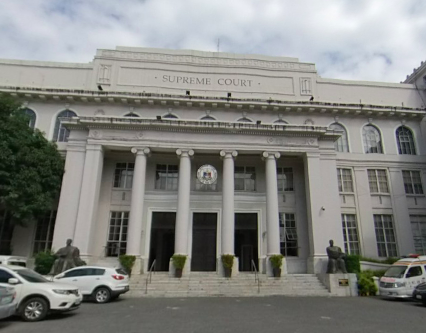MANILA, Philippines — The Supreme Court has ruled that the privilege of the writ of amparo is meant to protect victims from the threat of extrajudicial killing, as it upheld a protective order for a woman who lost her husband to the Duterte administration’s war on drugs in 2016.
In denying the petition of law enforcers to dismiss the writ, the high court explicitly recognized the death of Christina Gonzales’ husband as an “extralegal killing,” and affirmed the finding of the Court of Appeals (CA) that the widow had good reason to fear for her life.
Gonzales’ husband, Joselito, was a suspected drug dealer who was killed in a police operation in Antipolo City in July 2016, shortly after then-President Rodrigo Duterte came into power.
The previous administration’s bloody campaign against illegal drugs claimed the lives of thousands of drug suspects, for which Duterte and his subordinates were charged with crimes against humanity in the International Criminal Court.
The Supreme Court has not published its decision in full, but its public information office released a summary on Tuesday.
According to the summary, the high court acknowledged various threats to Gonzales’ life, liberty, and security, including allegations that prior to the issuance of the writ in 2017, she and her husband were both solicited by law enforcers to sell illegal drugs and were threatened to be entrapped or murdered on several occasions.
Induced to deal
In her petition, Gonzales claimed that she and her husband had been “induced by respondent police officers to deal in drugs.” She said they decided to surrender in 2016 and to reform but some of the respondents threatened them. Her husband was later killed during an alleged encounter with the police.
In the decision penned by Justice Jhosep Lopez, the tribunal’s Second Division said the judicial relief provided by the writ of amparo consists of “appropriate remedial measures and directives that may be crafted by the court, in order to address specific violations or threats of violation of the constitutional rights to life, liberty or security.”
Human rights lawyer Edre Olalia, president of the National Union of Peoples’ Lawyers, said the ruling was a welcome development for victims of extrajudicial killings and their relatives.
“It puts needed judicial breaks to runaway police going berserk against basic rights of citizens using the erroneous justification and arbitrary judgment that they are guilty anyway,” he told the Inquirer.
“[The Supreme Court] is again starting to say ‘not too fast folks and enough already’ with these unrestrained abuses by police and military taking liberties at our liberties and who think they can do it again and again and again,” Olalia added.
In its decision, the court unanimously denied the petition for review filed by Antipolo law enforcers questioning the CA’s rulings on the case in 2018 and 2019, which upheld the writ of amparo.
Paid P50,000
The CA had recommended the filing of appropriate civil, criminal and administrative charges against the law enforcers, and issued a Permanent Protection Order prohibiting them and any of their agents from entering within a one-kilometer radius from Gonzales’ residence and work addresses.
Court records showed that the Gonzales couple were previously arrested for using and selling illegal drugs, but were eventually released after paying the amount of P50,000 demanded by the police.
The high court noted major lapses in the conduct of the police operation that resulted in Joselito’s death, raising doubts on its legitimacy.
It also noted how the law enforcement agents failed to follow several directives to reopen the investigation of the case.
‘To protect’
The high tribunal added that no documentation was provided to show that the usual procedure under Section 21 of Republic Act No. 9165, or the Comprehensive Dangerous Drugs Act of 2002, was observed when the illegal drugs were seized.
“The fact that respondent (Christina) and Joselito were previously arrested for selling illegal drugs is beside the point,” the court said, adding: “[Even] if the respondent committed a crime, the petitioners, as law enforcement agents, are not at liberty to disregard the respondent’s constitutionally guaranteed rights to life, liberty and security.”
The writ of amparo is a legal remedy to any person who felt that his/her life, liberty and security was threatened by an unlawful act or omission of a government official or of a private individual or entity.
First instituted by the Supreme Court in September 2007, the writ of amparo, from the Spanish word “amparar” (to protect), covers extralegal killings and enforced disappearances, and is seen as a deterrent to abuses committed by the military and police.
Another legal remedy, the privilege of the writ of habeas corpus, relieves persons from unlawful restraint. Habeas corpus is the power of a court to require the state to produce a person in custody.
The writ of habeas data, introduced in February 2008, gives individuals the right to find out what information is being kept about them by the government, and to demand their updating, rectification, or destruction.
—WITH A REPORT FROM INQUIRER RESEARCH
RELATED STORIES
CHR hopes DOJ drug war probes to yield more case filings
DOJ to get ‘drug war’ case files from PNP – Remulla
ICC asks PH, victims to comment on resumption of drug war probe
